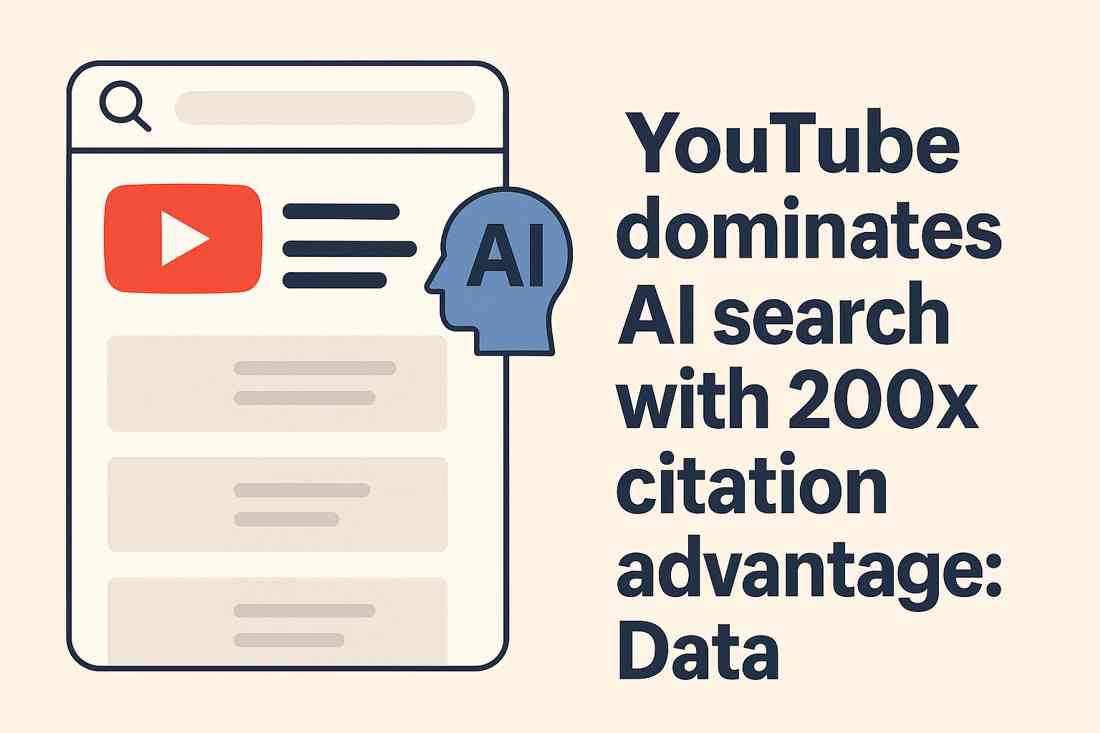It suddenly appears as though YouTube became the AI search results finalist; one wonders why.
Have you ever wondered why an AI tool always seems to send you back to YouTube for answers? In AI-powered search results, YouTube apparently has a citation advantage of 200x against other platforms, according to recent data. That means whenever any AI model such as ChatGPT, Gemini, or Perplexity fetches answers, YouTube occurs first 200 times out of 203 since then.
This is where the shift comes and becomes important- it changes information discovery on the web. If in fact, AI search is the way forward, whose bias will direct the relatively few pieces of information that get amplified? Then it is clearly not in favor of YouTube.
So, what exactly does this 200x citation advantage mean?
That number is impressive and extraordinary. Traditional search engine rankings used to be oriented toward web pages and blogs. But now, AI-based discovery considers YouTube SEO as the great loot. Every video-tutorials, explainers, reviews-has now greater chances of-being-cited-in-AI-responses as compared to articles published on actual web sites.
Or say, AI trusts Youtube more-And it could have been due to structured metadata or perhaps strong authority signals, or maybe the other deep value of visual content. And right now, Youtube is the reference library for the creation of AI.
Digital analyst Riya Sharma says, “AI is not only rewriting how we search; it is rewriting what gets seen. And right now, YouTube is writing the script.”
So, why would AI be favoring YouTube over websites?
There are a few key reasons:
Rich Metadata- Tags, captions, and categories decorate Youtube videos and paint them with an extreme level of detailing. The descriptions help the AI systems better understand the context.
User interaction: Watch time, likes, and comments are strong trust signals.
New content: YouTube keeps new content rolling in every day, something most blogs can’t dream of achieving.
In other words, authority, clarity, and freshness become the big three factors on YouTube.
What are content creators and marketers supposed to answer?
A big wake-up call to creator-marketers! Sure, a traditional blog post still matters but making video an integral part of your digital content strategy is no longer optional. Here’s what you need to do to stay competitive:
Optimize videos for search, clear title, keyword-rich description, and great captioning.
Adding YouTube into your website SEO cannot be separated.
Re-pack your above-the-fold content from blog posts into eye-catching video explainers.
At iTech Manthra, we have always put a big emphasis on the growing role of AI in digital marketing and how creators can use both text and video to future-proof their strategy. (Related: Generative Engine Optimization)
Would this change affect Google’s search engine?
Here is the story’s crazy turn: Google also owns YouTube. Should AI tools and search engines for that matter both elevate YouTube content, this portal may be established as the ultimate authority. This could change web discovery for the user and, over time, blur the distinction between AI search results and regular search listing.
According to the industry’s expert Mark Davies: “We are in the time where videos have gone beyond mere entertainment to the core of all knowledge distribution.”
What does the path ahead for AI search look like?
AI might become intelligent enough to balance citations. While YouTube ranks top today, platforms such as Reddit, Medium, and Wikipedia are fighting for visibility. So, very well may the future of search be an amalgam of video-first insights with long-form text resources down below.
Creativity is all about juggling. If we really want that edge, we need to do a bit of everything-a well SEO-friendly website and a YouTube channel kept active on a daily basis. (Related: Explanation of 10x Content)
FAQs
Q1. What does a “200x citation advantage” mean in common English?
It means that AI systems cite YouTube videos in answers at least 200 times more than all other sources combined.
Q2. Does this mean blogs are dead?
Definitely, no! Articles still rank on Google, but AI tends to lean towards videos a bit when giving answers.
Q3. How to optimize for AI search?
Make good video content with good metadata, upload often, and then embed or link to it from your blog or website.
Q4. Will YouTube SEO ever kill the normal SEO?
No. But they are becoming more and more intertwined by the day. Practically, you want to do both.
Q5. Is this just about YouTube, or do other platforms count?
At the moment, YouTube is at the forefront with other platforms such as Reddit and Quora gaining visibility for AI.
Conclusion
That 200x citation advantage for YouTube isn’t just some statistic; it was a message of where AI was going to take content discovery. Your next big step, if you are working on building your brand, has to be video. The sooner you do that, the stronger you will be in the AI-driven future.
Kumar Swamy is the CEO of Itech Manthra Pvt Ltd and a dedicated Article Writer and SEO Specialist. With a wealth of experience in crafting high-quality content, he focuses on technology, business, and current events, ensuring that readers receive timely and relevant insights.
As a technical SEO expert, Kumar Swamy employs effective strategies to optimize websites for search engines, boosting visibility and performance. Passionate about sharing knowledge, he aims to empower audiences with informative and engaging articles.
Connect with Kumar Swamy to explore the evolving landscape of content creation!
